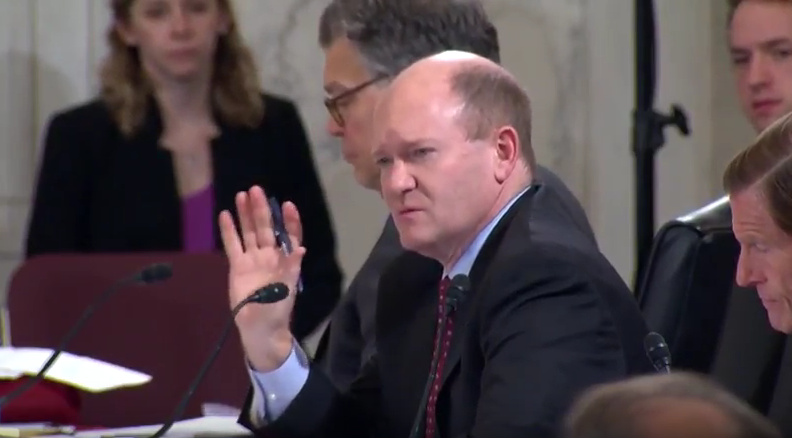WASHINGTON, D.C. — U.S. Senator Chris Coons (D-Del.), the first Delaware Senator in more than four decades to serve on the critical Appropriations Committee, joined his colleagues on the committee to approve annual appropriations bills for Agriculture, Rural Development, Food and Drug Administration, and Related Agencies as well as Energy and Water Development. These two bills passed out of the Appropriations Committee unanimously and are now ready for consideration by the full Senate.

"Defending funding for our farmers and rural communities is a priority for me. I’m thrilled the Agriculture bill contains strong funding for animal and plant health, farm conservation programs, rural water, and rural housing. These funds will help maintain the health of our poultry industry, ensure produce imported at the Port of Wilmington is disease-free, support farmers in protecting Delaware’s land and waterways, strengthen our rural communities, and much more,” said Senator Coons. “Further, the strong funding for the Army Corps of Engineers in the Energy and Water Development bill means we will be able to make continued investments in harbor maintenance and shore protection. I also strongly support the investments made by the Department of Energy important for basic science, energy innovation, and advanced manufacturing. All of these investments mean jobs, economic opportunity, and a cleaner environment for Delaware.”
A list of Senator Coons’ priorities that are included in appropriations bills are below:
U.S. Department of Agriculture
Support for animal and plant health
Senator Coons fought for $953.2 million for the Animal and Plant Health Inspection Service (APHIS), $143.2 million above the budget request and $7 million above the FY2017 enacted level. This funding will help continue programs to control or eradicate plant and animal pests and diseases that threaten U.S. agriculture production, including poultry through the $55.3 million for Avian Health programs.
Support for Farm Bill conservation programs
Senator Coons fought to protect Farm Bill-authorized levels of funding for conservation programs. This includes over $5 billion for programs such as the Conservation Reserve Program, Agricultural Conservation Easement Program, Conservation Stewardship Program, Environmental Quality Incentives Program, and Regional Conservation Partnership Program.
Support for rural communities
Senator Coons fought for $550 million for rural water and waste disposal, $18 million for the Circuit Rider program, and $6.5 million for Grassroots Source Water Protection. These programs help ensure that rural communities have clean, safe, and affordable drinking water and sewer service. He also fought for $1 billion for the direct loan program, which provides low-income rural families with home loan assistance, and $1.345 billion for rental assistance for affordable rental housing for low-income families and the elderly in rural communities.
Support for agriculture research
Senator Coons fought for $1.369 billion for the National Institute of Food and Agriculture and $375 million for the Agriculture and Food Research Initiative (AFRI). This supports research, education, and extension grants to improve rural economies, increase food production, mitigate the impacts of climate variability, ensure food safety and security, and train the next generation of our agricultural workforce.
Army Corps of Engineers
Support for water infrastructure programs
Senator Coons fought for strong utilization of the Harbor Maintenance Trust Fund ($1.34 billion), which supports maintenance of our ports and shipping channels, ensuring maritime commerce can proceed smoothly. He also fought for $50 million to maintain coastal protections.
Department of Energy
Support for science, energy research and advanced manufacturing
Senator Coons fought for funding for continuing investments in basic science, energy research, and innovative manufacturing programs. Funding within the Department of Energy includes $330 million for ARPA-E as well as $5.5 billion for the Office of Science, including $110 million for the Energy Frontier Research Centers. Additionally, $70 million was provided for the Manufacturing USA Institutes. The University of Delaware has been awarded funding through these important programs for a number of years. Further, Delaware will continue to receive funding through the Weatherization Assistance Program and State Energy Program which focus on energy efficiency improvements for low income households and energy activities respectively. These and other programs were slated for elimination under the Trump budget request which were rejected by the Senate.